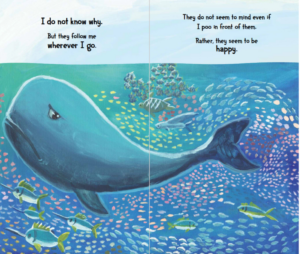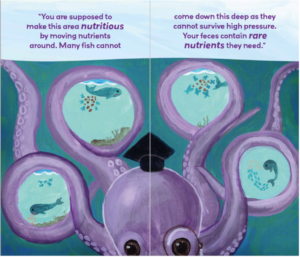Young teen activists make US debut in playfully educational children’s book
 San Francisco, CA – This World Ocean Day, journey through the ocean with Baby Whale in this fundamental children’s book about a young whale who is too shy to poop and its importance to the ecosystem in Daniel and Benjamin Kim’s spirited story and US debut, The Whale Who Refused to Poo (Common Planet, June 8, 2023).
San Francisco, CA – This World Ocean Day, journey through the ocean with Baby Whale in this fundamental children’s book about a young whale who is too shy to poop and its importance to the ecosystem in Daniel and Benjamin Kim’s spirited story and US debut, The Whale Who Refused to Poo (Common Planet, June 8, 2023).
Having started before the age of ten, two brothers, Daniel and Benjamin wrote six children’s books all ranging in different endangered animals. After much success in Korean and their book, A Letter from Sumatra, adapted for the screen, the young teen activists share their delightful stories to the US audience. The Whale Who Refused to Poo is the first book to be released and all proceeds benefit the protection of endangered animals.
Baby Whale feels shy about pooping in the ocean. Surrounded by other fish and plankton, he never learned why he had to poop in front of everyone. He journeys to the bottom of the ocean for some privacy and meets a scholarly octopus who explains to him how important it is to poop; that it helps share important nutrients to the fish and plankton around him. With this new knowledge, Baby Whale is ready to go back to the surface and poop again.
With deeper themes and lessons of the interconnection between all creatures featuring beautifully drawn images, The Whale Who Refused to Poo is the perfect book to help children understand the importance of protecting animals in their ecosystem and teaching them that some things are necessary for survival.
“The Whale Who Refused to Poo”
Daniel and Benjamin Kim
June 8, 2023 | Children’s book
Paperback | 978-1-960920-00-3 | $14.99
Ebook | 978-1-960920-01-0 | $9.99
 DANIEL KIM: Daniel attends a middle school in the Bay Area. His love of dinosaurs and disappointment at their extinction sparked his interest in endangered animals on the brink of extinction. He believes that creating a world that is good for animals also means a better world for humans. In his free time, Daniel enjoys reading, playing tennis, and listening to music. You can find him blogging on his site, commonplanet.org.
DANIEL KIM: Daniel attends a middle school in the Bay Area. His love of dinosaurs and disappointment at their extinction sparked his interest in endangered animals on the brink of extinction. He believes that creating a world that is good for animals also means a better world for humans. In his free time, Daniel enjoys reading, playing tennis, and listening to music. You can find him blogging on his site, commonplanet.org.
In an interview, Daniel can discuss:
- The successful launch of his books in Korea and his release to the US audience
- His continued love for animals and how it shaped his desire for animal activism and what it means to be a child activist
- The colorful appeal of his stories and how he shares knowledge through playful narrative and the impact he is making with his books
- The worldwide importance of his stories and how children of any culture can understand its message
- The research behind The Whale Who Refused to Poo and the impact whales have on their ecosystem
- His aspirations for helping animals in the future
- How he and his brother collaborated to write six books, short films and continue to create more
Take a look inside The Whale Who Refused to Poo


An Interview with
Daniel Kim
1. Where did your love for the environment come from? What sparked your interest in writing books?
As a child, I was fascinated by dinosaurs and could easily identify hundreds of different species. However, my love for these prehistoric creatures was tempered by the realization that they had gone extinct. Years later, during a visit to the San Diego Zoo, I learned that we were observing one of the last three surviving Northern White Rhinos, a species on the brink of extinction due to human negligence. This experience opened my eyes to the harsh reality that many animals face today and inspired me to spread awareness about conservation efforts. I firmly believe that a world where animals thrive is a better world for all of us.
2. Baby whale struggles pooping in front of his friends, but learns that it’s important for the ecosystem. How did you research the importance of whale poop to the ecosystem?
As an avid conservation enthusiast, I frequently indulge in reading books and articles about animals. During one of my recent explorations, I stumbled upon an article about the remarkable nutrition pump that whales create in the ocean, which serves as a catalyst for the surrounding ecosystem. This discovery left me captivated and sparked a thought within me. It reminded me of how children are often intrigued by the topic of poop. I am convinced that this unique story has the potential to serve as an excellent educational resource, and inspire a new generation of conservationists.
3. Do you want to be an environmentalist when you get older? What else do you want to study? What does being an activist mean to you?
Although I am currently uncertain about the specific field of study I would like to pursue, I possess a deep-rooted passion for contributing to the cause of animal conservation and helping to make our world a better place. While activism is a crucial way to make a difference, I also firmly believe that breakthrough technologies developed by scientists and medical professionals have the potential to make a significant contribution to animal conservation. Moreover, policymakers and media companies have a pivotal role to play in this effort.
Despite my current uncertainty concerning how and where I will contribute, I remain resolute in my unwavering commitment to supporting environmental improvement for the betterment of both our present and future generations. I wholeheartedly subscribe to the notion that we have merely borrowed this nature from our future generation and that we have no right to destroy it.
4. I heard these books are in other languages! What made you decide to translate the books into Korean and Chinese?
The purpose of our books is to inspire and empower children to take action in saving the planet and its inhabitants, ultimately safeguarding our own future. We also leverage various media formats, such as animated movies, to amplify our message and reach a wider audience. Our goal is to spread awareness and foster a global movement, where everyone plays a crucial role in creating a sustainable future for generations to come. Join us in making a lasting impact and be part of the change we wish to see in the world.
5. I heard that you’re already working on another book! What’s your next book going to be about?
I am currently engaged in the development of a narrative that centers around an animal on the precipice of extinction. Although I am not at liberty to disclose specific details regarding the animal or the storyline, I can reveal that this is a project of great personal significance to me.
6. What do you hope your books will inspire? What do you want kids to take away from your books?
My ultimate objective with my books is to foster empathy and understanding towards these imperiled creatures. By sharing their story and drawing attention to their plight, my hope is to instill a greater appreciation for the value of all life, and to inspire people to take action to safeguard these vulnerable species.
I believe that storytelling has the power to effect meaningful change and to forge deep connections between people and important causes. Through my writing, I aspire to make a meaningful contribution towards raising awareness about the urgent need to protect our planet’s most precious and threatened species.

A former award-winning journalist with national exposure, Marissa now oversees the day-to-day operation of the Books Forward author branding and book marketing firm, along with our indie publishing support sister company Books Fluent.
Born and bred in Louisiana, currently living in New Orleans, she has lived and developed a strong base for our company and authors in Chicago and Nashville. Her journalism work has appeared in USA Today, National Geographic and other major publications. She is now interviewed by media on best practices for book marketing.
